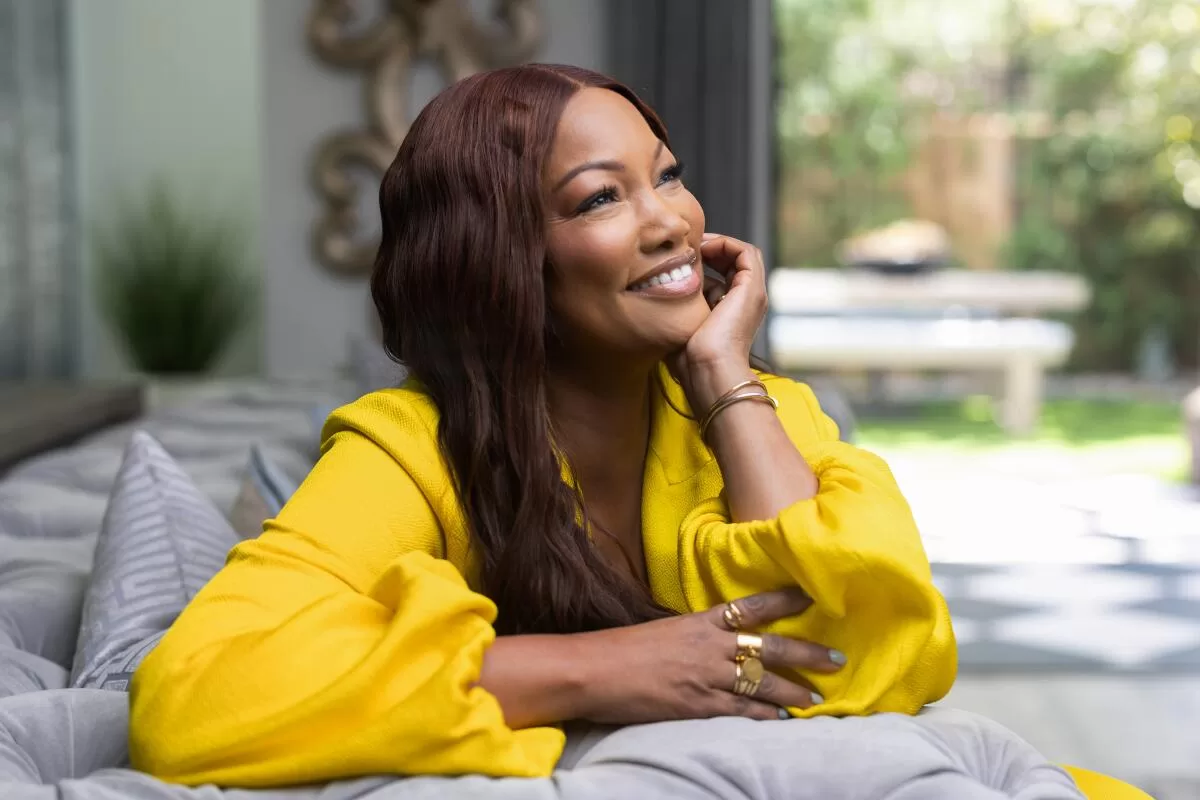Welcome to Screen Gab, the newsletter for everyone who just wants to go where everybody knows your name — even if it’s not to Cheers.
As Ted Danson proves in the new Netflix series “A Man on the Inside,” he can make friends anywhere, including the retirement home. In this case, with an assist from costar Stephen McKinley Henderson: As series creator Mike Schur explains to senior writer Yvonne Villarreal in this week’s Guest Spot, the pair’s friendship is the show’s central (platonic) “love story.”
Also in Screen Gab No. 158, our editor catches up on the acclaimed “Say Nothing,” plus more streaming recommendations for your weekend.
Newsletter
You are reading Screen Gab newsletter
Sign up to get recommendations for the TV shows and streaming movies you can’t miss, plus exclusive interviews with the talent behind your favorite titles, in your inbox every Friday
You may occasionally receive promotional content from the Los Angeles Times.
ICYMI
Must-read stories you might have missed
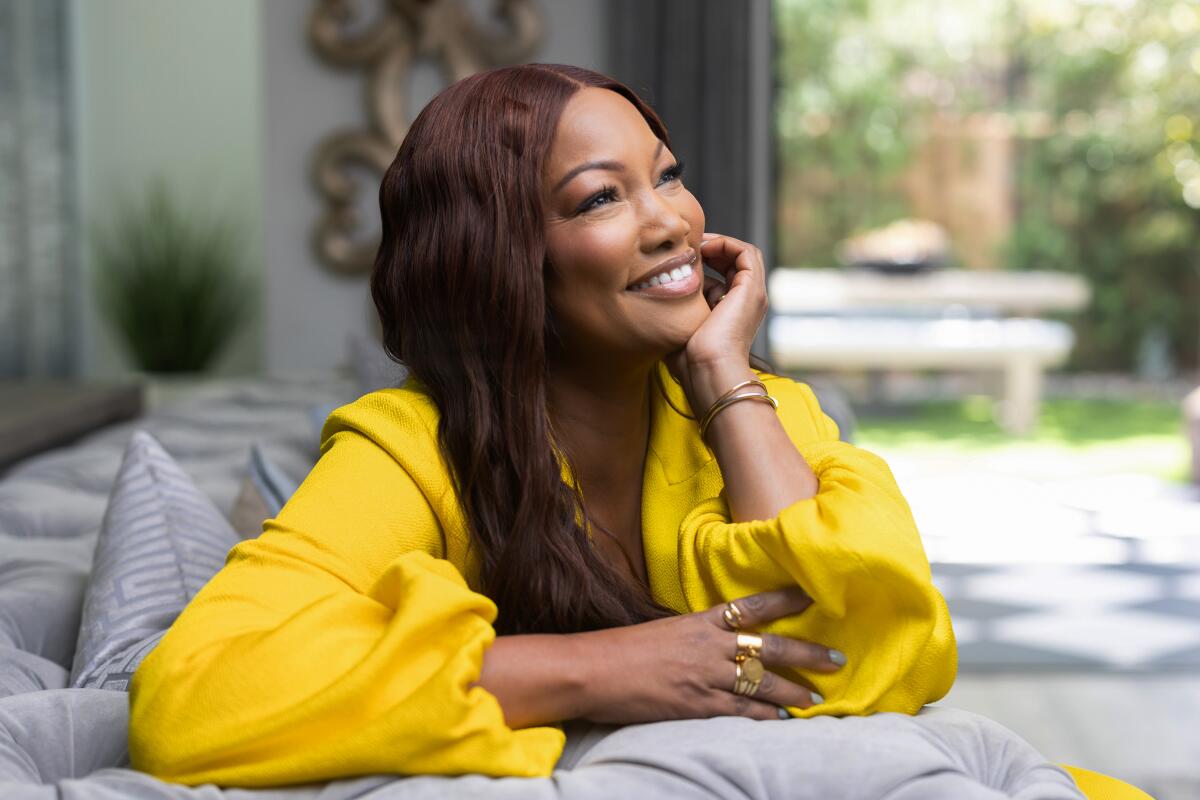
“Real Housewives of Beverly Hills” star Garcelle Beauvais.
(Jason Armond/Los Angeles Times)
Garcelle Beauvais is outspoken, on and off ‘Real Housewives of Beverly Hills’: The actor and cast member of “The Real Housewives of Beverly Hills” discusses the latest season, the presidential election and how she’d leave the show if her sons asked her to.
‘The Later Daters’ shows that dating after 55 ‘is a lot sexier than people think’: A Netflix docuseries from executive producer Michelle Obama follows six singles over age 55 as they go on a series of blind dates and attempt to find love again.
After controversial snub, ‘Piano Lesson’ returns Danielle Deadwyler to Oscar race: Two years ago, the actor found herself in an Oscars controversy after being snubbed for “Till.” Now she returns with “Piano Lesson,” and Netflix on Friday — and awards watchers predict payback.
What to watch this holiday season: ‘Dear Santa,’ musical variety shows and a cute little owl: Santa is an evergreen staple this holiday season, and expect a plethora of variety specials from the likes of Sabrina Carpenter, Nate Bargatze, Jimmy Fallon and Motown legends.
Turn on
Recommendations from the film and TV experts at The Times
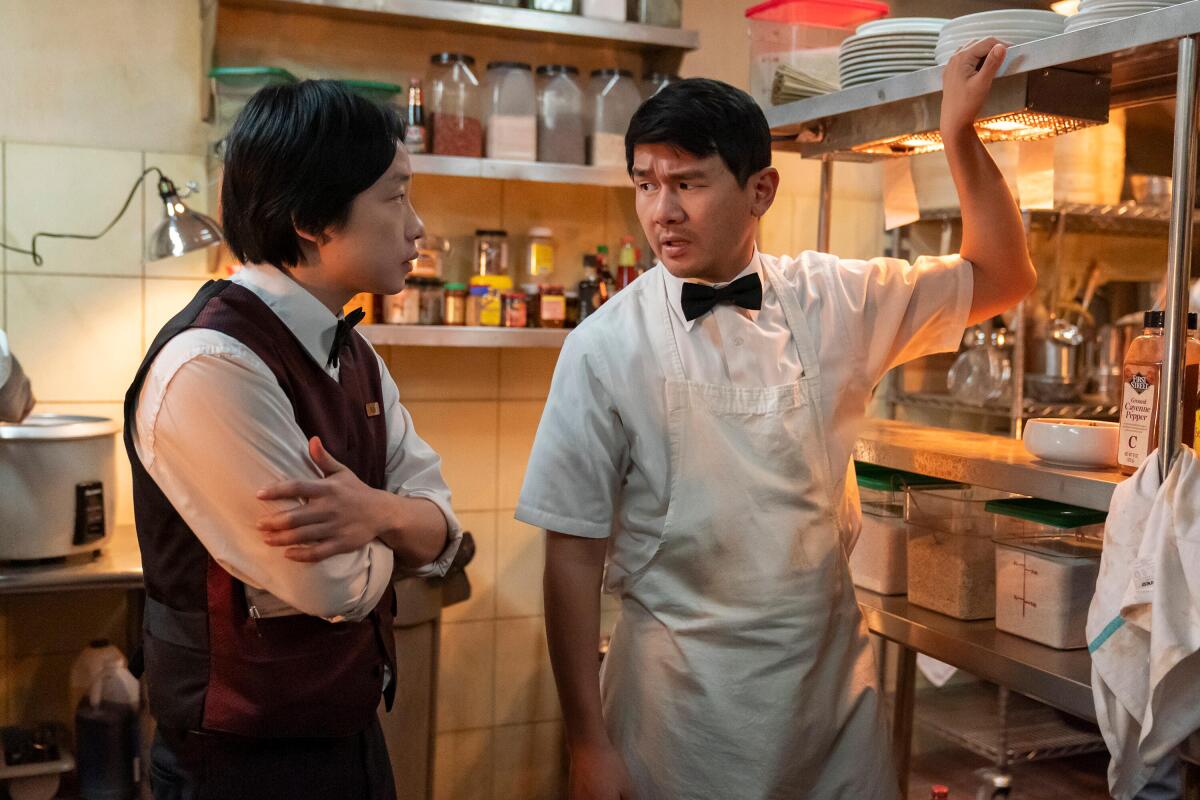
Jimmy O. Yang and Ronny Chieng in “Interior Chinatown.”
(Mike Taing/Disney)
“Interior Chinatown” (Hulu)
Or “Int. Chinatown,” like a shooting script, as the show’s opening title renders it. This quirky, megafictional, permeable realities miniseries, adapted by Charles Yu from his 2020 National Book Award-winning novel, stars Jimmy O. Yang as Willis Wu, a waiter in a Chinese restaurant in the imaginary metropolis of Port Harbour, which is also the setting of a police show called “Black & White,” whose hot detective characters will introduce themselves into Willis’ world. (Yu worked on “Legion,” “Lodge 49” and “Westworld,” other shows with one foot in ordinary existence and the other … somewhere else.) Willis, who sees himself as “a background character in someone else’s story,” feels invisible and trapped; he’s not the first character to wish for some excitement in his life, then get it in spades. The series moves between unrealities in ways that are not always easy to track or parse, except on a metaphorical, poetical level — it has things to do with image, and self-image, as it relates, or doesn’t, to Chinese Americans, and how media warps, limits and controls our narratives. To paraphrase the Beatles, though he feels as if he’s in a screenplay, he is anyway. Ronny Chieng stands out as Willis’ grumpy but grounded best friend. — Robert Lloyd
READ MORE: Jimmy O. Yang is finally No. 1 on the call sheet with ‘Interior Chinatown’
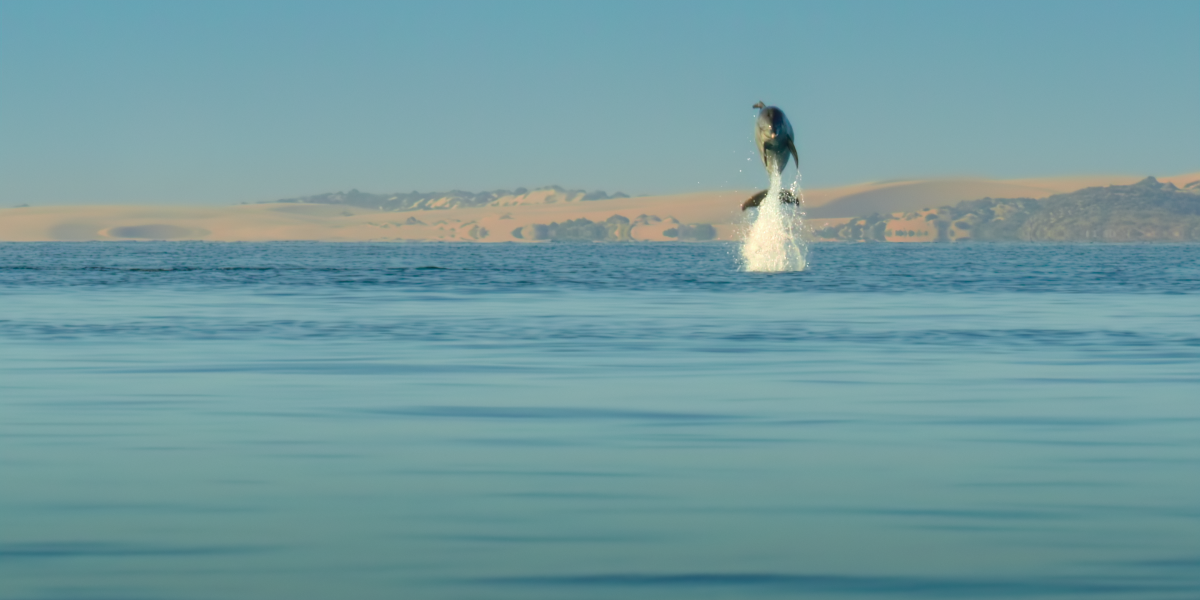
A scene from the Netflix documentary “Our Oceans.”
(Netflix)
“Our Oceans” (Netflix)
There’s no denying that David Attenborough is the king of the nature documentary, but there’s a new voice entering the space: former President Obama. “Our Oceans” is the latest nature docuseries to arrive on Netflix, and the five episodes are focused on each of the world’s largest bodies of water, starting with the Pacific Ocean — you’ll see a bit of Los Angeles here as well. The series is executive produced by James Honeyborne, who previously worked at the BBC Natural History Unit, and Obama, who narrates each episode. Obama’s narration is light, familiar and informative, fluctuating with the mood of the stunning visuals that take us from the surface down to a world of sea creatures, underwater volcanoes and vegetation. While the focus is largely on what happens underwater, it also addresses how humans have an effect on the Earth’s oceans. If you’re looking for a calming and educational series to watch with your family over the holidays, put this one in your queue. —Maira Garcia
Catch up
Everything you need to know about the film or TV series everyone’s talking about
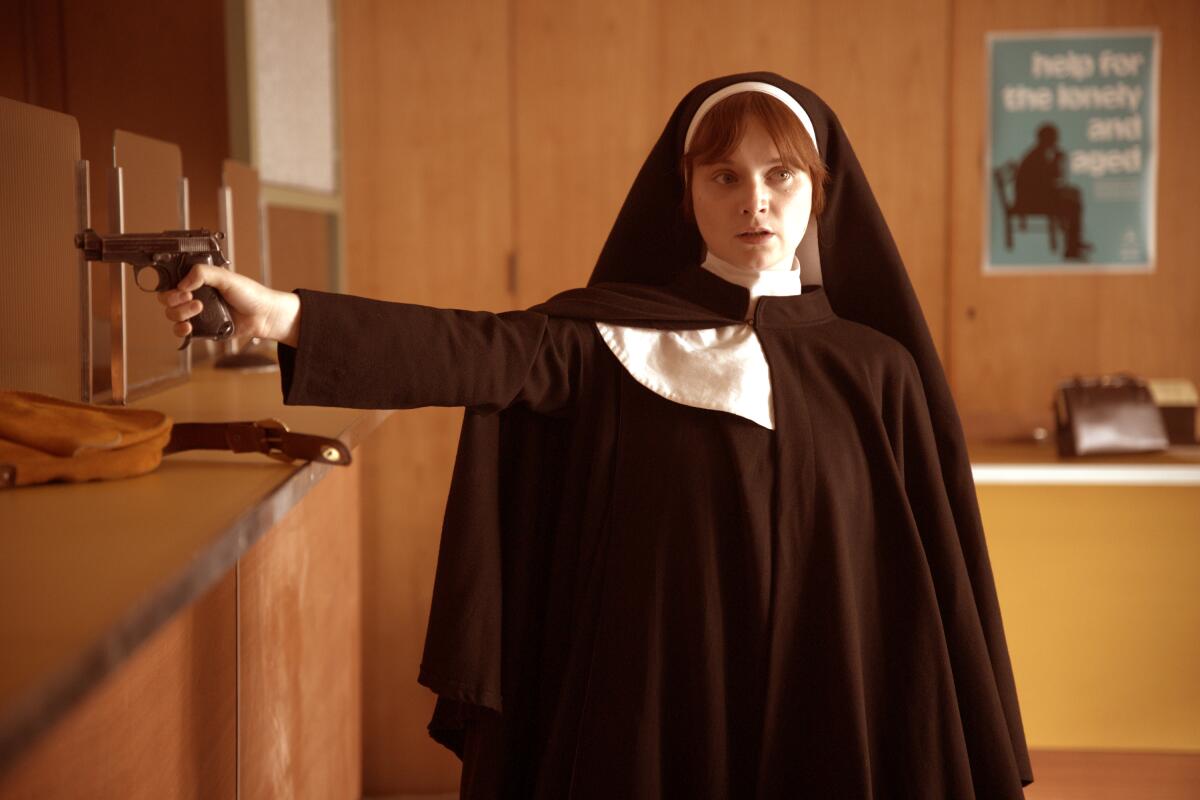
Lola Petticrew as Dolours Price in “Say Nothing.”
(Rob Youngson/FX)
The trio of episodes on which “Say Nothing” (FX, Hulu) turns arrive at mid-season, after we’ve been charmed by the spirited Dolours Price (Lola Petticrew) and her taciturn younger sister, Marian (Hazel Doupe), and won over to their cause of “a free and united Ireland.” Which may explain why execution of Irish republican informers, the civilian carnage unleashed by a London car bombing and the torture of force feeding in an English prison resonate so powerfully: The series never reduces its protagonists’ struggle, or the consequences, to mere political abstraction. Instead, through the prism of the Prices and radical counterparts like Brendan Hughes (Anthony Boyle), the subject is richly — and often terrifyingly — drawn; the chaotic plot to bomb the Old Bailey, Britain’s foremost criminal court, comes off as a childish escapade at its most dangerous, for instance, while the sisters’ subsequent hunger strike seems saintly in its conviction.
The point, of course, captured in riveting detail in Patrick Radden Keefe’s 2018 history of the Troubles and now Josh Zetumer’s nine-part miniseries adaptation, is that violence inevitably belittles its perpetrators’ ideals, no matter which side they’re on. Dolours and Marian’s humiliation at Brixton prison belies snippets of radio chatter about the righteousness of the British legal system, while the bombing, or the execution of “touts,” reduces the fight for freedom to the much grubbier motives of fear and control. By the end of “Say Nothing,” complicity in the conflict embraces everyone from Rory Kinnear’s ruthless British commander in Belfast, Frank Kitson, to Josh Finan’s stony, slimy Gerry Adams, leaving behind only bullet-pocked buildings, unmarked graves and grim memories. No one can be said to have won the war, in this construction: They either outlived it, or they did not. —Matt Brennan
READ MORE: ‘Say Nothing’ explores ‘human wreckage’ wrought by young radicals during the Troubles
Guest spot
A weekly chat with actors, writers, directors and more about what they’re working on — and what they’re watching
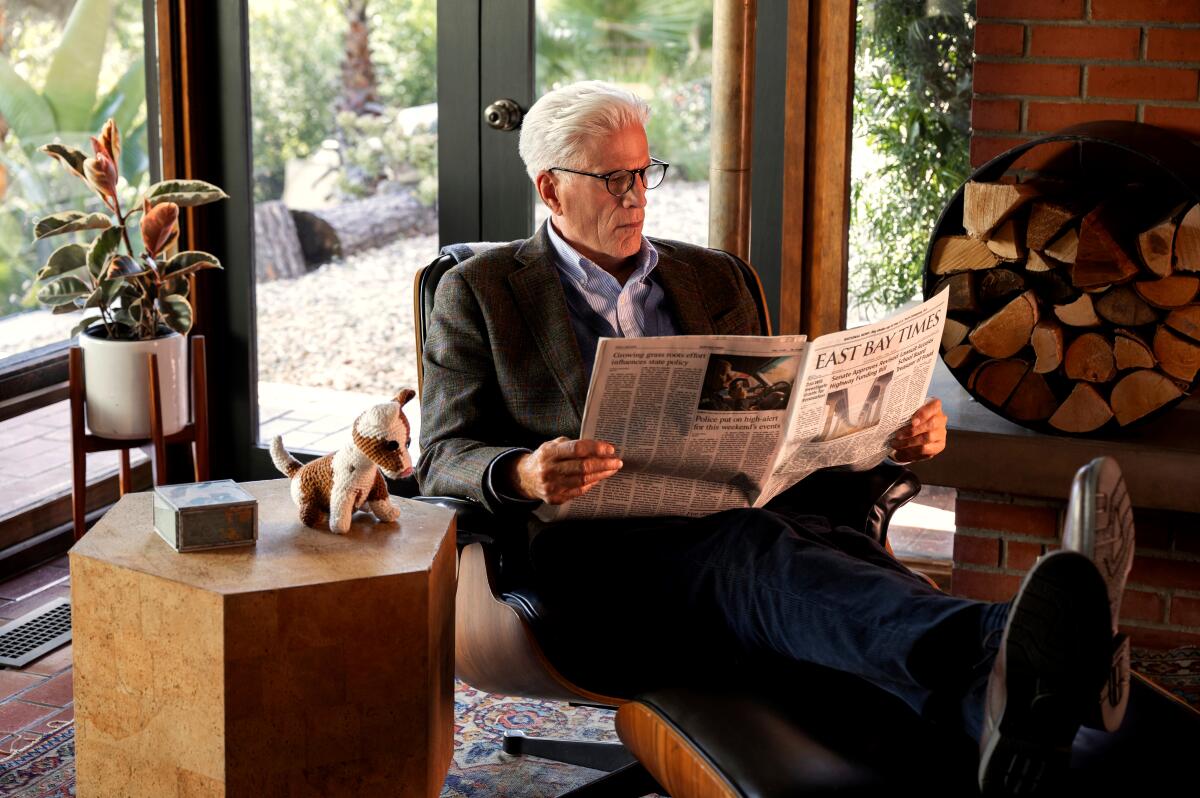
Ted Danson in “A Man on the Inside.”
(Colleen E. Hayes/Netflix)
After exploring morality and ethics together in the NBC sitcom “The Good Place,” prolific TV creator and producer Mike Schur is teaming up with actor Ted Danson for yet another profound comedy that will leave you thinking. “A Man on the Inside,” an eight-episode series available to stream on Netflix, unpacks loneliness and the search for purpose late in life. Based on the Oscar-nominated 2020 documentary “The Mole Agent,” the series stars Danson as a retired professor and widower who finds a new lease on life when he’s tapped by a private investigator to go undercover at a San Francisco retirement home to find the thief of a missing heirloom. Here are some outtakes from my recent conversation about the series with Schur. —Yvonne Villarreal
READ MORE: Ted Danson and Mike Schur celebrate ‘living a bigger life’ with age in ‘A Man on the Inside’
What were the goal posts from the documentary that you looked to as a guide? Or did you think about spy series and movies like “Get Smart” as you thought about how to calibrate the tone of the show and balancing the very comedic bits with these incredibly moving, heartfelt moments?
“Get Smart” was actually cited as, like, we don’t want this to be “Get Smart.” The comedy there is in the broadness and the gigantic-ness. I thought of one joke from the documentary, in particular, and used that as the constant, to use a reference to “Lost.” It was the joke where the private investigator is saying, I won’t get it exactly, “You’re not getting enough information for me. You have a target, and you have to follow her. Do you understand me? You have to follow her.” And it cuts to Sergio, one foot behind her, just walking with a completely serious face — like “he told me to follow her, so I’m following her.” And she’s using a walker and they’re moving at a third of a mile an hour. That made me laugh so hard. And what made me laugh about it was innocence and sincerity. It was 100% sincere. He was interpreting something too literally, but he wasn’t making a joke. When you talk about tone, I think of it always as Legos. You get a pile of Legos and you don’t know what goes where and you start assembling them. And if you assemble it wrong, nothing after you do that works. So if something in a scene doesn’t work, or an episode doesn’t work, it’s because you put the wrong Lego in the wrong place, and that means [the] tone is now off.
In the midst of the task at hand, Charles, the character Ted plays, is developing these sweet and meaningful friendships. There’s a moment where, during a field trip away from the retirement home, he’s sitting in the redwoods with Calbert (Stephen McKinley Henderson), talking about their late wives — it was nice to see two older men sharing that kind of tender moment.
The thing that is going to make their relationship matter is — the day starts off with, like, “let’s have an adventure,” but really what it is is a series of conversations about their lives. And I really wanted to go to the redwood forest because having shot there for “The Good Place,” and having been there many times, it is the most silent and contemplative place I’ve ever been on Earth. It is so still, and it just feels like a place where people who maybe have a hard time expressing themselves could if they were sitting next to each other; could find it in themselves to kind of crack open. They’re there, and they’re talking just about the redwood forest, and then he mentions every time he’d come with his wife, he would ramble on about the root system and his wife would say, “Please just shut up. Enjoy it.” And Calbert says, “I like Victoria [Charles’ wife].” And Charles says, “Me too.” That could have been the end of the scene, but it continues. And Ted does this thing where he turns back and you see him thinking, “Do I want to talk about her?” And for the first time in a long time, the answer is yes. He physically shifts away from Calbert, then he physically shifts back toward him. And it’s the most lovely, heartbreaking little moment.
It was the relationship in the show that we were the most attentive to, I would say. This is a love story. All great love stories are two people who have a hole in their heart somewhere, or it’s filled with the other one. In this case, it’s not romantic, but it has the same beats, the same arc as any romantic relationship — which is, “I’m not a complete person, and I’m looking for someone who can help complete myself.” And they find it in each other.
What did working on the series get you thinking about? Help you work through?
Part of the big idea behind the season was, “This cannot just be a show about a 75-year-old man who takes this new job. It has to also be about that man’s daughter.” I am in her position. And like a lot of people roughly my age, plus or minus 10 years, you’re in this sandwich between your kids and their many needs and desires and problems and frustrations, and your parents, who suddenly, out of nowhere, need you. They rely on you for advice and guidance and money and happiness and everything else. There was a different opening to the show that we ended up not using because I think it gave the audience the wrong idea of what the show was really going to be about. But it was basically follow[ing] the daughter’s day of chaos [rather than Charles’ limited routine, which ultimately became the opening].
Parents, as Charles says at one point, don’t want to be a burden, and the kids are like, “You’re not a burden.” But the secret is they kind of are because I’ve never experienced you needing me for this stuff before. You feel guilt and you’re upset at yourself for feeling that way, and it’s just the most complex melange of emotion, and it comes out of nowhere. Whether it’s because of health or job loss or retirement or depression or whatever, all of a sudden, your parents matter to you in a different way, and they affect your life in a different way, and you’re affecting their lives in different ways. So I’m trying to be very in the moment myself about my relationship with my parents and what it means and where they are in their lives. My mom had knee surgery and now might have surgery on her other knee. I’m trying not to project forward, trying to just be like, “What’s the situation right now?” Because it’s scary. One of the things I think about a lot is this is the best case scenario. For a parent to live long. This is what you hope will be the case. Both my parents are still alive, and the fact that they now need their kids in a different way than they used to is such a blessing and I’m very grateful for it.
